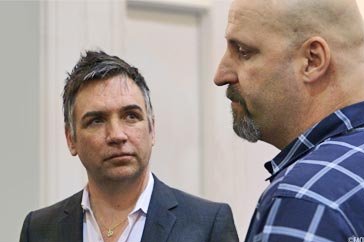At the Oscars on March 2, queer eyes will be on “Dallas Buyers Club” to take home some statues, but there is an interesting competition between two films — one with queer content, the other by a queer filmmaker — vying for Best Short Subject Documentary. PGN recently spoke with the two filmmakers about their projects.
“Facing Fear,” written and directed by the straight Jason Cohen, artfully chronicles the intersecting lives of Tim Zaal, a Neo-Nazi, and Matthew Boger, a gay man. Twenty-six years ago, Tim and his friends beat up Matthew and left him for dead. Yet Matthew survived. Working as a manager at the Museum of Tolerance in Los Angeles, Matthew unexpectedly reunited with Tim — now a former Neo-Nazi — and forgives his attacker.
PGN: How did you come to learn about the story of Tim and Matthew? JC: This was part of a larger project with the Fetzer Institute, a nonprofit that does work about promoting love and forgiveness. Tim and Matthew’s story jumped out at me; it was about exploring this process of forgiveness. In talking about how we address bullying and hate, it struck me as something I wanted to explore.
PGN: Do you think you could have forgiven Matthew if you were Tim? JC: I had to think about how I would react in that situation, but I really don’t know. I don’t know that I could forgive. But the only way to know is to be [Matthew] and go through his experiences. Forgiveness is not a cut-and-dry issue. We wanted to show that their personal experiences and societal factors were part of the process as they came back into each others’ lives.
PGN: Do you think Matthew was just in the wrong place at the wrong time? JC: I think this attack happened in 1980, so there was no such thing as a hate crime. It was a gay-bashing. If it happened today, it would have been looked at differently.
PGN: How has being nominated for an Oscar changed your life and/or work as a filmmaker? JC: I’m happy to be nominated, and we’ll see what happens. It’s a huge boost and hopefully it will continue to blossom from there. With this recognition, we get to do this on a wider scale.
Edgar Barens’ “Prison Terminal: The Last Days of Private Jack Hall” is a somber and fascinating short-documentary film that explores a unique hospice center at the Iowa State Penitentiary. Chronicling the last two weeks in the life of Jack Hall, a decorated soldier who went to prison for 21 years for murdering a drug dealer, Barens’ film prompts a reconsideration of how end-of-life care issues are being handled for the incarcerated.
PGN: How did you come to learn about the story of Jack Hall and the Iowa State Prison Hospice? EB: I didn’t seek Jack out from the get-go; it was a random thing. By the time Iowa State Penitentiary approved me to visit, I stationed myself in the infirmary, as I was highlighting the hospice program. I got to know the inmate volunteers, who are also orderlies. Jack was a long-term patient. Three months into my stay, I realized he was one to focus on, and got to know his story.
PGN: What was your goal in making this film? EB: My first goal was to humanize the prisoner. These are people who made horrible mistakes. I wanted to know the inmate who was dying, why the inmates who helped were doing it, as well as about the doctors and nurses. My goal was to show these [hospice] programs work, that they don’t cost anything and they need to be expanded.
PGN: You are a gay filmmaker. Was there a reason you chose not to tell a gay story? EB: I don’t shy away from gay issues, but none of my larger films are gay-themed. My next documentary started with a queer topic. I love doing films on criminal justice. It’s become my cause. I feel that society needs to open their eyes and we can’t lock people up and throw away the key. I guess it is my calling. These people have no voice.
PGN: What has been the impact of the experience of being nominated on your life and work as a filmmaker? EB: I don’t think I prepared myself for this. I’m flabbergasted by this sudden attention the film is getting. Other folks who have been nominated or won said that my life will or might change the way of getting funding, and people will be interested in your projects. I’m bracing myself. Nothing drastic has happened yet. It’s crazy. My friends are more flipped out than I am. But this is actually happening. When I got the cover letter from the Academy, it gave me chills.
